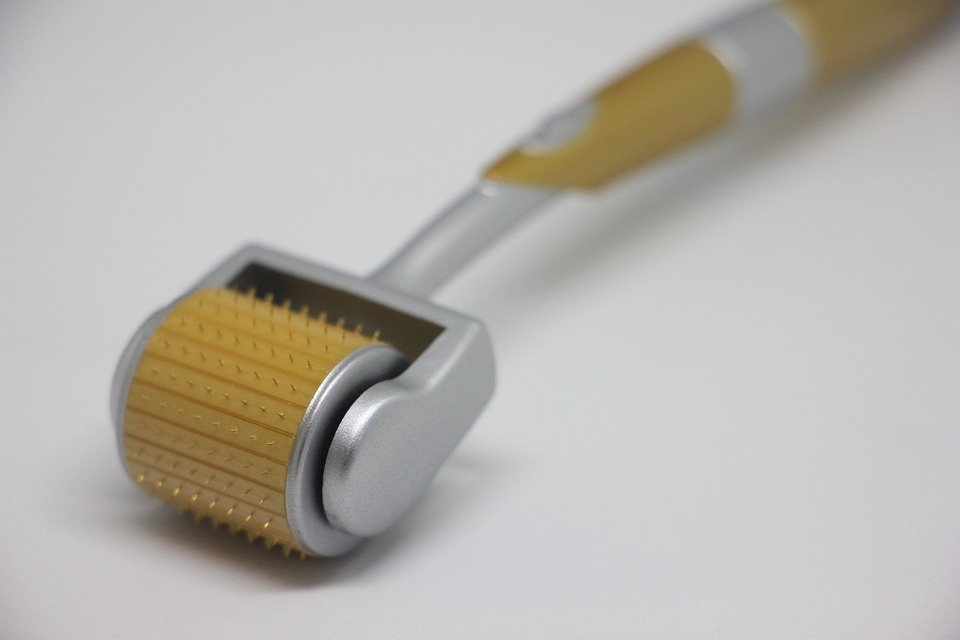Many people are singing praises about a prickly device called a derma roller and its benefits on the skin. But will a derma roller work for you as it does for them? Is it safe to use a derma roller at home?
NOTE: As with anything we do to our bodies, make sure you know what your doing and are prepared. You can also visit an experienced specialist in derma rolling to help ensure you do the treatment properly. Its always better to be safe than sorry!
What is derma rolling?
Dermarolling, micro needling or skin needling is a skin care treatment which involves the use of a derma roller. A derma roller is a handheld device which features a small wheel containing hundreds of tiny needles, or microneedles. The prickly wheel is used by rolling over the skin, with the needles puncturing and penetrating the epidermis (the skin’s outermost layer). This action triggers the production of collagen and elastin which will, in turn, cause the skin to heal itself and become even healthier than before.
While the derma roller looks like a torture device, it is, in fact, a helpful tool. Fans of the derma roller could not help but heap praises on this prickly device. In fact, derma rolling is one of Hollywood’s best-kept beauty secrets, with A-listers such as Kim Kardashian, Jennifer Aniston, and Angelina Jolie swearing by the effectiveness of derma rollers.
So, that only means that the derma roller could be your “holy grail” to achieve the smooth and flawless skin that you’ve been dreaming of. Derma rollers are used extensively in most skin care clinics, only they use the original DermarollerTM brand which is the highest-quality version – and also the most expensive.
However, with the subsequent proliferation of more affordable derma roller brands in the market, they are now made available for home use. Some of the at-home derma rollers are almost as good as the original DermarollerTM.
Is a derma roller really safe to use at home?
You may have probably heard one of your friends talking about derma rollers, and how effective they would be in removing acne scars and wrinkles. Most likely, you have been talked into getting a derma roller for yourself. You may be interested, but you are not sure whether it works for you or whether is it safe to use at home.
Just like using a shaving razor – if a derma roller is used correctly and properly, then it won’t pose any risk or danger. If you don’t leave the derma roller just lying around on the floor, then it won’t cause any accidents and injuries. (But why should you leave it scattered on the floor in the first place, anyway?)
First of all, you must be aware that a derma roller should be kept clean and aseptic at all times – and that means it shouldn’t touch any dirty surfaces. It should be washed in hot water and disinfected before and after use; else, it could lead to infections.
When using a derma roller, make sure that you have the proper equipment (see link “Complete Rolling Guide” to check out the full list of equipment needed for derma rolling). Always remember to wear disposable gloves throughout the derma rolling procedure to avoid contamination.
Follow the proper instructions when using the derma roller. Start by rolling gently, then increase pressure as you go along so that the needles create tiny infiltration channels in your skin’s epidermis. But do not roll too hard as to hurt yourself, especially if you are someone who has a low threshold of pain.
After the derma rolling itself, the tiny perforated channels stay open for about an hour. This is the best time to apply serums such as hyaluronic acid, vitamin C, anti-aging serums and moisturizers. Additionally, apply an anti-bacterial cream to the open channels on your skin to prevent infection.
If you must re-use a derma roller beyond the recommended times of usage, then you should be extra cautious. By then, there should be some blood stains that must be cleaned off. Again, we advise you to wash your roller first in hot water and then disinfect it before and after the treatment. If the needles are blunt or broken, dispose of the derma roller right away.
Avoid derma rolling if you have:
- Pimples
- Boils
- Warts
- Fungal infections
- Herpes
- Eczema
- Hypersensitive skin
- Open wounds
- Rashes
- Sunburn
- Hives
- Moles
- Psoriasis
- Blood clotting disorders
- Skin cancer
Dermarolling is popular partly because it is a non-invasive skin treatment, compared to other procedures like injectable Botox or skin surgery. But like with many other home skin care procedures – especially involving the use of sharp and pointed objects – the use of the derma roller should be exercised with precision and care. If you consider using a derma roller at home, it’s recommended that you should consult your dermatologist first.
If you are still not confident to do derma rolling at home, going to a professional skin care specialist is your best bet.


